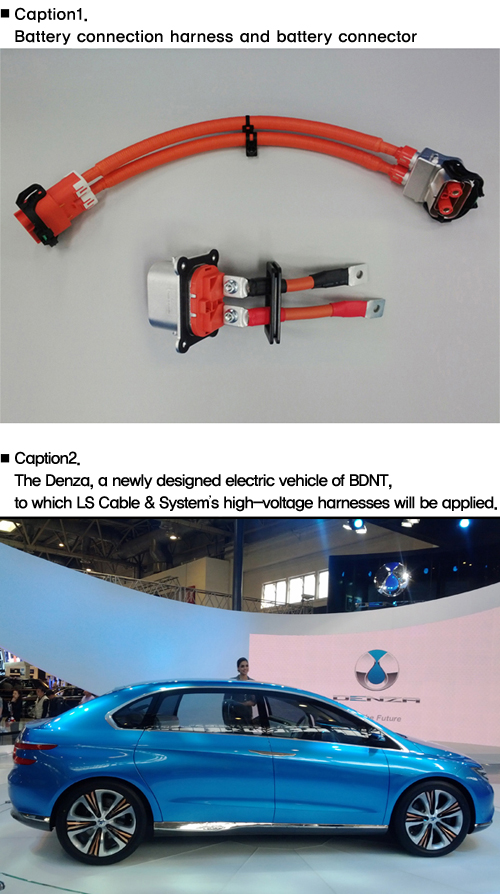MEDIA
LS NEWS
LS Cable & System enters Chinese electric vehicle market
LS Cable&System2012-06-27
■ Will supply $60 million (KRW 70 billion) worth of high-voltage wiring sets for 260,000 electric vehicles to a Daimler ? BYD joint venture company
■ Chinese government to invest $15 billion (KRW 17 trillion) by 2020
seoul, Korea, June, 27th - It was announced on the 27th that LS Cable & System had concluded a contract to the scale of $60 million (KRW 70 billion) with BDNT (BYD Daimler New Technology), a company founded to produce and market electric vehicles within China, to supply high-voltage harnesses (power supply wiring set) that will be fitted to 260,000 electric vehicles over the next five years. With this contract, LS Cable & System was once again acknowledged of its world-class product quality and secured a solid foundation to expand into the Chinese automobile and electric vehicle markets which are growing at the fastest rates in the world. To that end, LS Cable & System, with an investment of $3.4 million (KRW 4 billion), extended its production lines to manufacture harnesses for 150,000 vehicles a year at its plant in Wuxi, Jiangsu.
The harness is a device that distributes power and delivers signals to various electronic parts, sensors ands devices of an automobile. That is, as electronic controls and communication modules are organically connected inside vehicles, electric current and information generated by various sensors are delivered to their corresponding parts through the harness. As electronic parts of an automobile can be compared to the blood vessels or nerve network of a human body, harnesses can be said to have a decisive effect on the quality of a vehicle. The high-voltage harnesses used in electric vehicles handle 900V, which is far higher than the 12V harnesses used in general vehicles by as many as 75 times. To promote its high-voltage harnesses for electric vehicles, LS Cable & System started product development six years ago and now holds a lineup of cables and connectors that are known for their stability and shielding technologies.
LS Cable & System will supply BDNT with connectors and harnesses for battery modules, vehicle inverters and air conditioner parts. Each of the products was separately developed to satisfy the requirements of BDNT. The products will be applied to the Denza, an electric vehicle for which Mercedes Benz handled the design and safety systems, and BYD was in charge of the batteries, motors and electric control parts as well as driving tests. The Denza was showcased at the Beijing Motor Show in April and became a hot topic of conversation among journalists and visitors alike.
The electric vehicle market in China is developing at the fastest rate. According to the “Eco-friendly and new energy automotive industry development plans (2012 ? 2020)” announced by the State Council in April, China has laid out a policy to increase the cumulative production and sales volume of hybrid and electric vehicles up to 5 million by 2020. To accomplish this, the Chinese government plans to invest $15 billion (equivalent to approx. KRW 17 trillion). Accordingly, LS Cable & System, by winning this contract, will secure an advantageous position for entry into the Chinese market.
“This was an achievement of our solution-centered business pursued as part of our business model innovation,” explained LS Cable & System President & CEO Jongho Son. “In particular, we have taken a successful first step in entering the automobile and electric vehicle market abroad.”
Caption1.
LS Cable & System announced on the 27th that it concluded a contract to supply $60 million (KRW 70 billion) worth of high-voltage harnesses to BDNT in China. From the top, battery connection harness and battery connector.
Caption2.
The Denza, a newly designed electric vehicle of BDNT, to which LS Cable & System’s high-voltage harnesses will be applied
※BYD (Build Your Dreams)
BYD, the world’s largest electric vehicle maker, stands for “Build Your Dreams.” This is the 10th ranking automobile company in China. BYD was founded in 1995 by Chairman Wang Chuan-fu in Shenzhen city, Guangdong province. The company started R&D on lithium batteries in 2000 and became China’s largest mobile phone battery maker in 2008 with a global market share of 15%. As of 2012, BYD was ranked the world’s No. 1 in nickel cadmium, nickel hydrogen and lithium battery production. BYD entered the automotive industry by taking a 77% equity stake in an established Chinese car maker in 2003 and then, in 2008, launched its F3DM, which is a charger used not only in electric vehicle charging stations, but also by general households. Through a joint venture with Daimler?Benz, BDNT (BYD Daimler New Technology) was established in March 2010. In July of the same year, BDNT, as the world first, supplied electric vehicles (E6) for use as taxis and police cars. BYD made global headlines in 2008 when Warren Buffett invested in the company.
-
LS Cable & System wins USD 110 million order in Kuwait.
LS Cable&System2012-07-05 -
LS Cable & System enters Chinese electric vehicle market
LS Cable&System2012-06-27 -
LS Cable & System fosters electric power professionals through a unique educational program
LS Cable&System2012-06-11 -
LS Cable & System flocking carpet certified for eco-friendliness
LS Cable&System2012-05-31 -
LS Cable & System awarded U.S. environmental certifications for rubber flooring
LS Cable&System2012-04-26